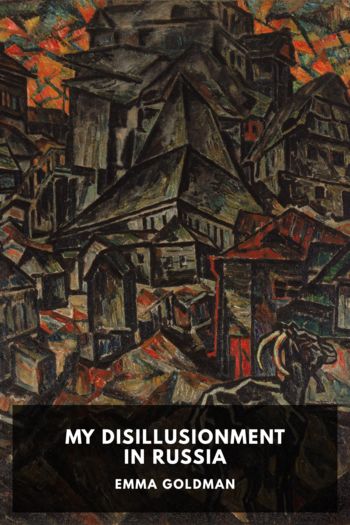My Disillusionment in Russia by Emma Goldman (books to read romance txt) 📕

- Author: Emma Goldman
Book online «My Disillusionment in Russia by Emma Goldman (books to read romance txt) 📕». Author Emma Goldman
When the two Ukrainian comrades learned of our arrival in Russia they repeatedly tried to reach us, but owing to the political conditions and the practical impossibility of travelling, they could not come north. Subsequently they had been arrested and imprisoned by the Bolsheviki. Immediately upon their release they started for Petrograd, travelling illegally. They knew the dangers confronting them—arrest and possible shooting for the possession and use of false documents—but they were willing to risk anything because they were determined that we should learn the facts about the povstantsi10 movements led by that extraordinary figure, Nestor Makhno. They wanted to acquaint us with the history of the Anarchist activities in Russia and relate how the iron hand of the Bolsheviki had crushed them.
During two weeks, in the stillness of the Petrograd nights, the two Ukrainian Anarchists unrolled before us the panorama of the struggle in the Ukraine. Dispassionately, quietly, and with almost uncanny detachment the young men told their story.
Thirteen different governments had “ruled” Ukraine. Each of them had robbed and murdered the peasantry, made ghastly pogroms, and left death and ruin in its way. The Ukrainian peasants, a more independent and spirited race than their northern brothers, had come to hate all governments and every measure which threatened their land and freedom. They banded together and fought back their oppressors all through the long years of the revolutionary period. The peasants had no theories; they could not be classed in any political party. Theirs was an instinctive hatred of tyranny, and practically the whole of Ukraine soon became a rebel camp. Into this seething cauldron there came, in 1917, Nestor Makhno.
Makhno was a Ukrainian born. A natural rebel, he became interested in Anarchism at an early age. At seventeen he attempted the life of a Tsarist spy and was sentenced to death, but owing to his extreme youth the sentence was commuted to katorga for life.11 The February Revolution opened the prison doors for all political prisoners, Makhno among them. He had then spent ten years in the Butirky prison, in Moscow. He had but a limited schooling when first arrested, but in prison he had used his leisure to good advantage. By the time of his release he had acquired considerable knowledge of history, political economy, and literature. Shortly after his liberation Makhno returned to his native village, Gulyai-Poleh, where he organized a trade union and the local soviet. Then he threw himself in the revolutionary movement and during all of 1917 he was the spiritual teacher and leader of the rebel peasants, who had risen against the landed proprietors.
In 1918, when the Brest Peace opened Ukraine to German and Austrian occupation, Makhno organized the rebel peasant bands in defence against the foreign armies. He fought against Skoropadski, the Ukrainian Hetman, who was supported by German bayonets. He waged successful guerilla warfare against Petlura, Kaledin, Grigoriev, and Denikin. A conscious Anarchist, he laboured to give the instinctive rebellion of the peasantry definite aim and purpose. It was the Makhno idea that the social revolution was to be defended against all enemies, against every counterrevolutionary or reactionary attempt from right and left. At the same time educational and cultural work was carried on among the peasants to develop them along anarchist-communist lines with the aim of establishing free peasant communes.
In February, 1919, Makhno entered into an agreement with the Red Army. He was to continue to hold the southern front against Denikin and to receive from the Bolsheviki the necessary arms and ammunition. Makhno was to remain in charge of the povstantsi, now grown into an army, the latter to have autonomy in its local organizations, the revolutionary soviets of the district, which covered several provinces. It was agreed that the povstantsi should have the right to hold conferences, freely discuss their affairs, and take action upon them. Three such conferences were held in February, March, and April. But the Bolsheviki failed to live up to the agreement. The supplies which had been promised Makhno, and which he needed desperately, would arrive after long delays or failed to come altogether. It was charged that this situation was due to the orders of Trotsky who did not look favourably upon the independent rebel army. However it be, Makhno was hampered at every step, while Denikin was gaining ground constantly. Presently the Bolsheviki began to object to the free peasant Soviets, and in May, 1919, the Commander-in-Chief of the southern armies, Kamenev, accompanied by members of the Kharkov Government, arrived at the Makhno headquarters to settle the disputed matters. In the end the Bolshevik military representatives demanded that the povstantsi dissolve. The latter refused, charging the Bolsheviki with a breach of their revolutionary agreement.
Meanwhile, the Denikin advance was becoming more threatening, and Makhno still received no support from the Bolsheviki. The peasant army then decided to call a special session of the Soviet for June 15th. Definite plans and methods were to be decided upon to check the growing menace of Denikin. But on June 4th Trotsky issued an order prohibiting the holding of the Conference and declaring Makhno an outlaw. In a public meeting in Kharkov Trotsky announced that it were better to permit the Whites to remain in the Ukraine than to suffer Makhno. The presence of the Whites, he said, would influence





Comments (0)